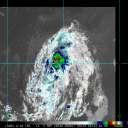Show Selection:
|
#902609 (Received by flhurricane at: 5:11 AM 11.Sep.2017)
TCDAT2
Hurricane Jose Discussion Number 24
NWS National Hurricane Center Miami FL AL122017
Issued by the NWS Weather Prediction Center College Park MD
500 AM AST Mon Sep 11 2017
Although Jose`s satellite appearance is somewhat degraded due to the
effects of northeasterly shear estimated to be near 25 kt, it has
been able to maintain persistent deep convection over the center. A
well-timed 0456Z GPM overpass helped to confirm that the center was
on the north side of the cold cloud tops while also highlighting
that an eye feature persists despite being obscured in conventional
imagery. Subjective and objective satellite-based intensity
estimates indicate that Jose continues on a weakening trend, and
this supports lowering the initial intensity to 90 kt for this
advisory.
The initial motion is estimated to be 335/09 kt as Jose continues
to track around the western side of a mid-level ridge. As this ridge
shifts to the southeast and south of Jose over the next 12 to 24
hours, its forward motion will slow, and the system will begin to
move toward the northeast. On days 2 and 3 a ridge will begin to
strengthen to the northwest of Jose, driving the system toward the
southeast. By day 4 the ridge will move to a position north of
Jose, which will gradually accelerate Jose toward the west-northwest
through day 5. The expectation is that Jose will complete a small
clockwise loop over the open waters of the western Atlantic the next
couple of days. Despite the complex forecast track, this general
solution is shared by all the reliable model guidance. The official
track forecast is shifted slightly north from the previous one due
to a northward shift in the ECMWF guidance, and is close to the GFEX
consensus model.
The northeasterly shear currently over Jose will shift to the
northwest and will ease a little, but remain strong enough to keep
Jose on a weakening trend through day 3. Although SSTs in the area
are warm enough to support an intense hurricane, a slow-moving and
looping Jose will likely move over its own cold wake around day 3,
as seen in HWRF guidance. On days 4 and 5, Jose will move toward
warmer water while the shear relaxes, and there is a potential for
reintensification. The latest intensity forecast is very close to
the IVCN consensus, but it is more aggressive in weakening Jose than
the SHIPS model, which is not accounting for interaction with the
cold wake.
A 1222Z ASCAT pass sampled Jose nearly perfectly, and the 34/50 kt
wind radii were adjusted based on this data.
FORECAST POSITIONS AND MAX WINDS
INIT 11/0900Z 24.4N 68.6W 90 KT 105 MPH
12H 11/1800Z 25.8N 69.3W 80 KT 90 MPH
24H 12/0600Z 26.8N 69.0W 75 KT 85 MPH
36H 12/1800Z 27.0N 67.6W 70 KT 80 MPH
48H 13/0600Z 26.3N 66.5W 70 KT 80 MPH
72H 14/0600Z 24.5N 65.5W 65 KT 75 MPH
96H 15/0600Z 25.0N 69.0W 70 KT 80 MPH
120H 16/0600Z 26.5N 73.0W 80 KT 90 MPH
$$
Forecaster Birchard |



